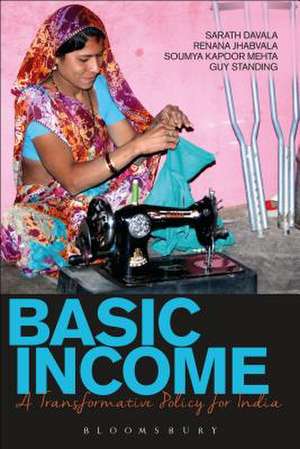Basic Income: A Transformative Policy for India
Autor Sarath Davala, Renana Jhabvala, Prof. Guy Standing, Soumya Kapoor Mehtaen Limba Engleză Hardback – 28 ian 2015
Preț: 716.56 lei
Preț vechi: 916.71 lei
-22% Nou
Puncte Express: 1075
Preț estimativ în valută:
137.11€ • 149.41$ • 115.54£
137.11€ • 149.41$ • 115.54£
Carte tipărită la comandă
Livrare economică 24 aprilie-08 mai
Preluare comenzi: 021 569.72.76
Specificații
ISBN-13: 9781472583109
ISBN-10: 1472583108
Pagini: 248
Dimensiuni: 156 x 234 x 23 mm
Greutate: 0.59 kg
Editura: Bloomsbury Publishing
Colecția Bloomsbury Academic
Locul publicării:London, United Kingdom
ISBN-10: 1472583108
Pagini: 248
Dimensiuni: 156 x 234 x 23 mm
Greutate: 0.59 kg
Editura: Bloomsbury Publishing
Colecția Bloomsbury Academic
Locul publicării:London, United Kingdom
Caracteristici
This project has received much attention in India, with more than a dozen newspaper articles, an invitation from Sonia Gandhi to present the results privately, and approaches from the opposition in various states to discuss implementing the scheme
Notă biografică
Sarath Davala is Senior Researcher for SEWA, the Self-Employed Women's Association of India, and has a doctorate in sociology from the University of Delhi.Renana Jhabvala is President of SEWA Bharat and National Co-ordinator of SEWA, a trade union of women with about two million members, and is a mathematician with degrees from Harvard and Yale.Soumya Kapoor Mehta is an economist working as a consultant for the World Bank in Delhi; she has written extensively on social policy issues and worked with UN bodies and the Government of India.Guy Standing is Professor of Development Studies, School of Oriental and African Studies (SOAS), University of London, UK. He is co-president of BIEN, the Basic Income Earth Network, and the author of The Precariat (2011) and A Precariat Charter (2014).
Cuprins
Preface1. The Transformative Challenge2. Basic Income Defined3. A Little More, How Much It Is4. Escaping the Debt Trap5. Creeping Towards Social Citizenship6. From Subsidised Malnutrition to Healthy Development7. Agency and Cultural Citizenship8. Rolling Out Basic IncomeBibliographyIndex
Recenzii
[This book] provides a convincing argument for the positive effects of a universal basic income on the multiple dimensions of poverty.
If you want to help the poor along all dimensions - education, health, financial inclusion, basic amenities and even asset creation - put additional money in their hands with no conditions attached. This is the simple but powerful message of this pioneering study. Vulnerable groups including women, Scheduled Castes and Tribes and the disabled gain more from the cash transfers than the general population. And - surprise, surprise - the cash has no effect on the consumption of alcohol and tobacco.
This important book contributes to the debate on basic income in India by analysing data and detailed case studies. Many countries have adopted cash transfers as a way of improving human development and building resilience. This book shows that the time has come to do the same in India.
If you want to help the poor along all dimensions - education, health, financial inclusion, basic amenities and even asset creation - put additional money in their hands with no conditions attached. This is the simple but powerful message of this pioneering study. Vulnerable groups including women, Scheduled Castes and Tribes and the disabled gain more from the cash transfers than the general population. And - surprise, surprise - the cash has no effect on the consumption of alcohol and tobacco.
This important book contributes to the debate on basic income in India by analysing data and detailed case studies. Many countries have adopted cash transfers as a way of improving human development and building resilience. This book shows that the time has come to do the same in India.
